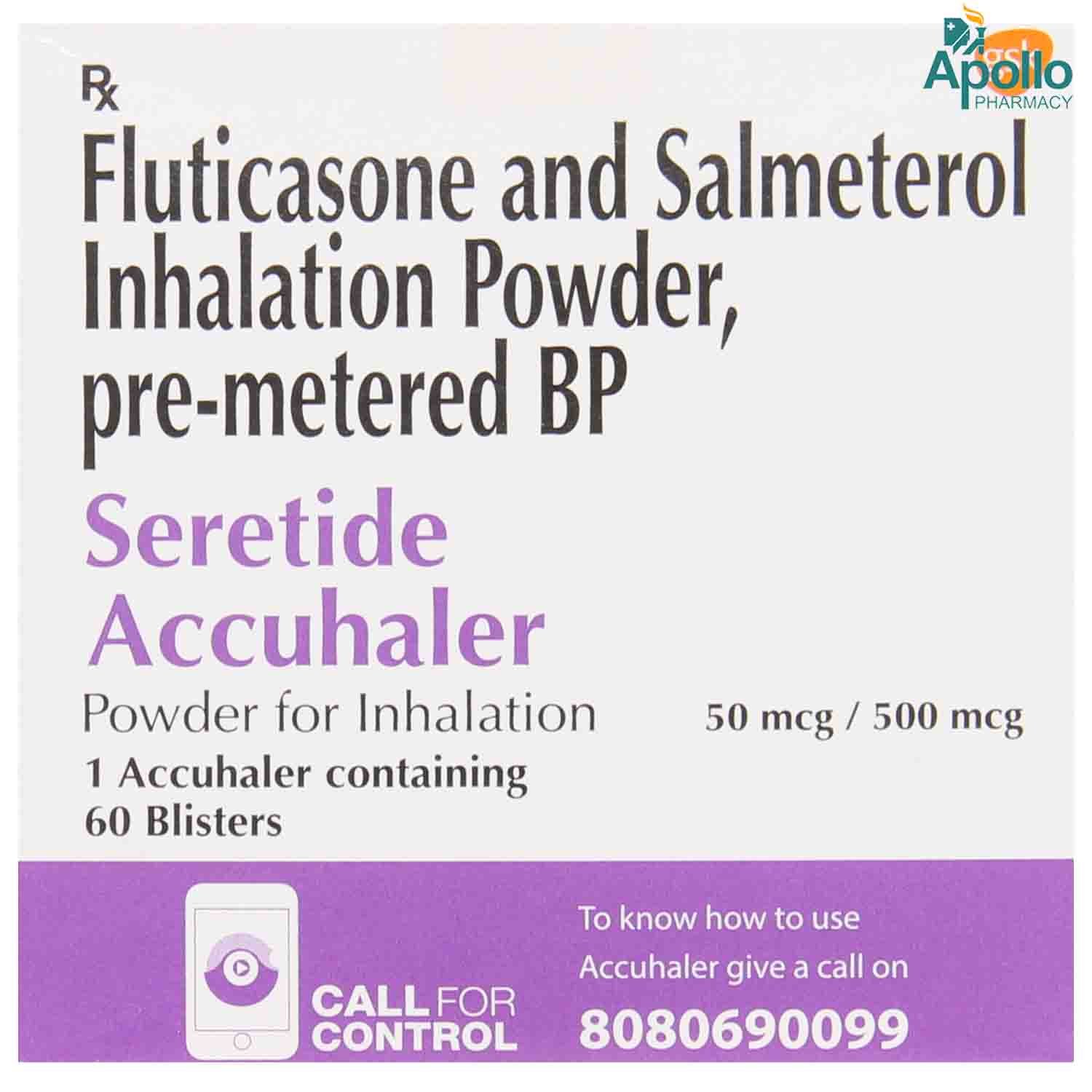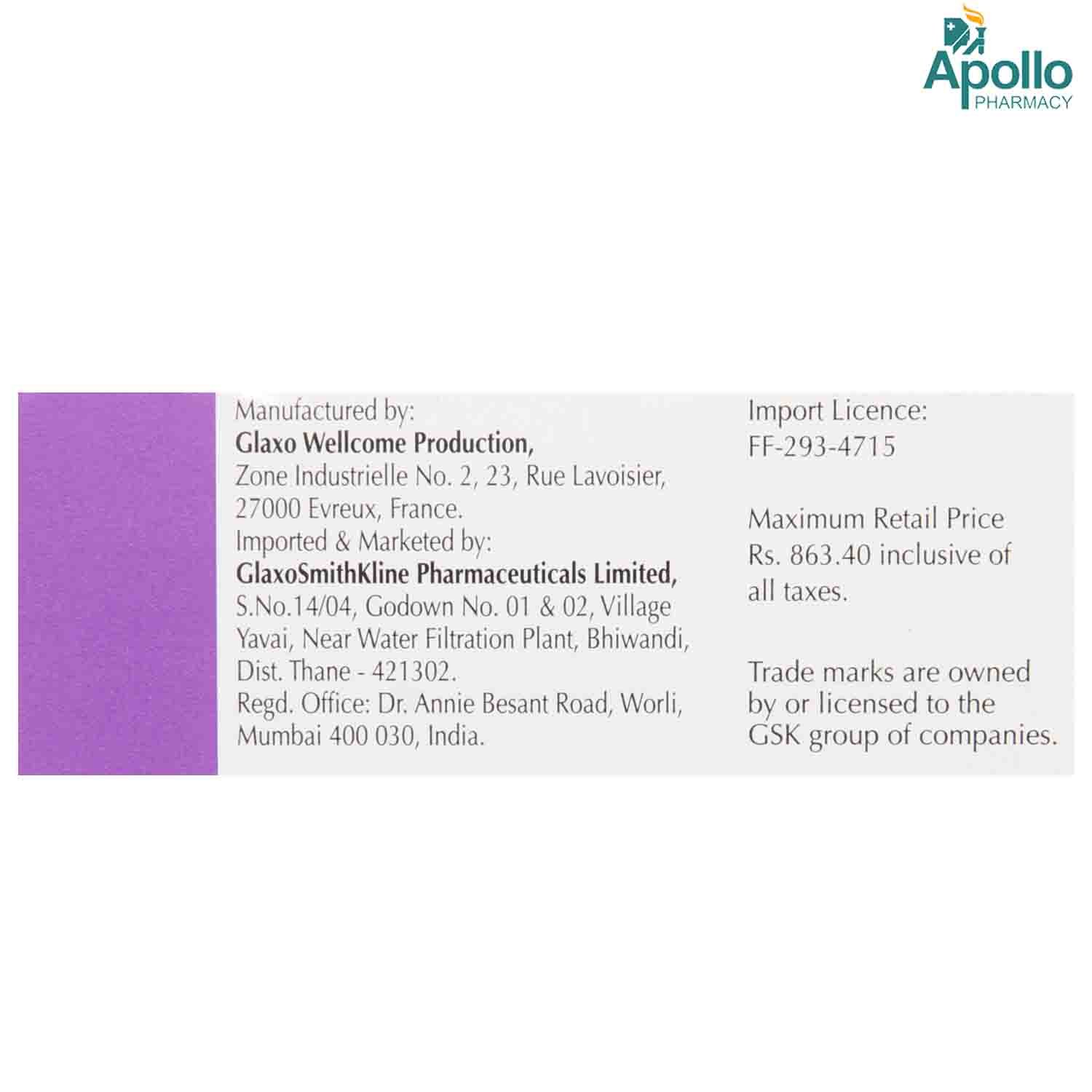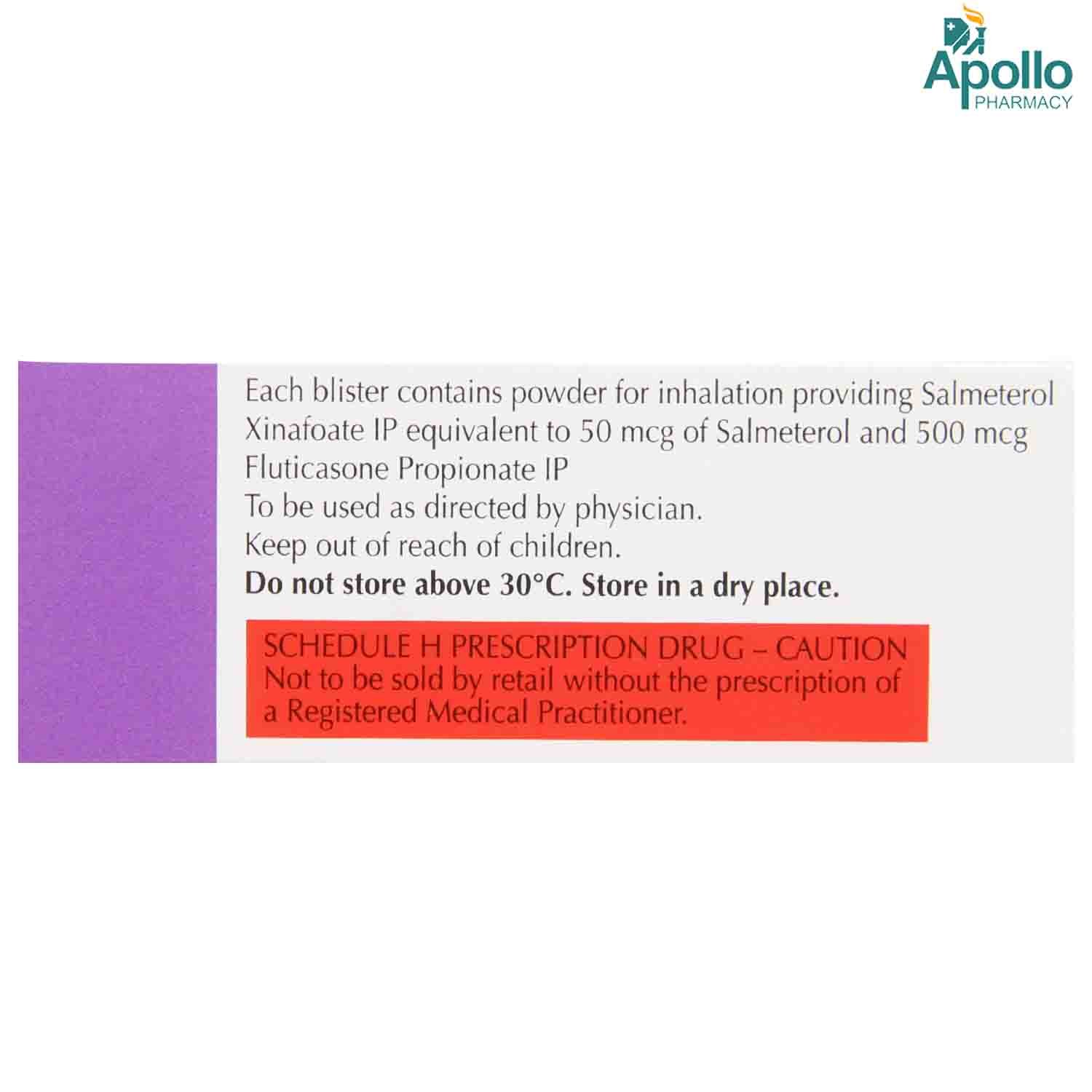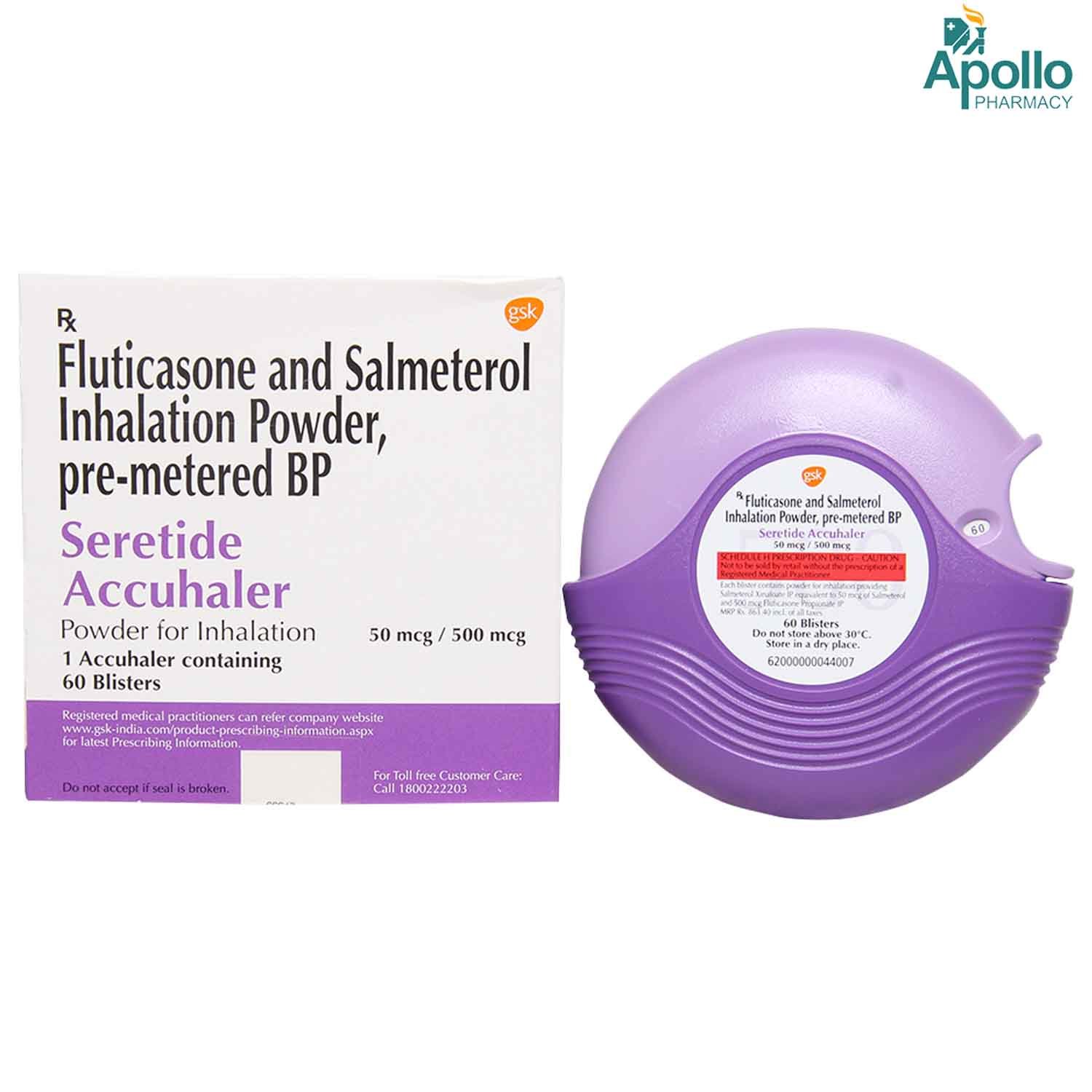Seretide 50mcg/100mcg Accuhaler




Selected Pack Size:60
60 ₹489.1
(₹8.15 per unit)
Out of stock
28 ₹223.2
(₹7.97 per unit)
Out of stock
MRP ₹543.45
(Inclusive of all Taxes)
₹81.5 Cashback (15%)
Seretide 50mcg/100mcg Accuhaler is used to treat and prevent respiratory disorders, such as asthma attacks and chronic obstructive pulmonary disease (COPD). It contains Salmeterol and Fluticasone, which relax the muscles in the airways and increase airflow to the lungs. It makes breathing easier by widening the airways. It may cause common side effects such as nausea, vomiting, respiratory tract infection, headache, sore throat, cough, bone, muscle or joint pain, increased heart rate, chills, black or tarry stools, and noisy breathing. Before taking this medicine, you should tell your doctor if you are allergic to any of its components or if you are pregnant/breastfeeding.
Know Your Delivery Time
Provide Delivery Location

Secure Payment

India's Most Trusted Pharmacy

Genuine Products
Composition :
Manufacturer/Marketer :
Consume Type :
Return Policy :
Expires on or after :
About Seretide 50mcg/100mcg Accuhaler
Seretide 50mcg/100mcg Accuhaler is used to treat and prevent asthma and chronic obstructive pulmonary disease (COPD). Asthma is a breathing disorder characterised by airway narrowing, swelling, and excessive mucus production, resulting in difficulty breathing. COPD is a group of lung diseases that includes emphysema (shortness of breath) and chronic bronchitis (inflammation of the lining of the bronchial tubes).
Seretide 50mcg/100mcg Accuhaler contains Salmeterol and Fluticasone. Salmeterol relaxes the muscles in the airways, increasing airflow to the lungs. Fluticasone acts by blocking the production of prostaglandins (chemical messengers) that cause inflammation (swelling) of the airways.
The common side effects of Seretide 50mcg/100mcg Accuhaler include nausea, vomiting, respiratory tract infection, headache, sore throat, cough, bone, muscle or joint pain, increased heart rate, chills, black or tarry stools, and noisy breathing, which gradually resolve over time. However, if the side effects are persistent, reach out to your doctor.
Try not to stop taking this medicine on your own. Therapy with nasal or inhaled corticosteroids like Fluticasone should be cautiously administered in patients with a fungal, bacterial, parasitic, or viral infection and tuberculosis, since there is a chance of developing a secondary infection. Please check with your doctor if you are pregnant, currently breastfeeding, or taking any other prescribed or non-prescribed medicines.
Uses of Seretide 50mcg/100mcg Accuhaler
Seretide 50mcg/100mcg Accuhaler is used to treat and prevent breathing problems associated with asthma and chronic obstructive pulmonary disease (COPD). The detailed uses of Seretide 50mcg/100mcg Accuhaler are as follows:
- Treatment of asthma: Used to relieve and prevent difficulty breathing, wheezing, shortness of breath, coughing, and chest tightness in people with asthma.
- Management of chronic obstructive pulmonary disease (COPD): Seretide 50mcg/100mcg Accuhaler controls and minimises symptoms such as wheezing, dyspnea, coughing, and chest tightness in patients with COPD, including chronic bronchitis and emphysema.
- Control of COPD flare-ups: Reduces the frequency and severity of COPD exacerbations while improving overall lung function.
- Anti-inflammatory effect: Fluticasone reduces airway irritation, which makes breathing easier.
- Long-acting bronchodilation: Salmeterol relaxes the airway muscles, helping breathing become easier over time.

Have a query?
Directions for Use
- Follow your doctor's instructions on the dosage and timing of this medication to ensure safe and effective use.
- Please read the instruction leaflet and use it as suggested by your doctor.
- Rinse your mouth with water and spit it out after using Seretide 50mcg/100mcg Accuhaler to avoid fungal infections in the mouth and throat.
Medicinal Benefits
- Seretide 50mcg/100mcg Accuhaler is used to treat and prevent respiratory disorders, such as asthma attacks and chronic obstructive pulmonary disease (COPD).
- Seretide 50mcg/100mcg Accuhaler improves pulmonary function and effectively treats and prevents the worsening of emphysema (shortness of breath) and chronic bronchitis (inflammation of the lining of your bronchial tubes).
- Seretide 50mcg/100mcg Accuhaler is a combination of Salmeterol (bronchodilator) and Fluticasone (corticosteroid). Salmeterol relaxes the muscles in the airways, increasing airflow to the lungs.
- It makes breathing easier by widening the airways.
- Fluticasone acts by blocking the production of prostaglandins (chemical messengers) that cause inflammation (swelling) of the airways.
- Fluticasone has potent vasoconstrictive (narrowing of the blood vessels) and anti-inflammatory activity.
How Seretide 50mcg/100mcg Accuhaler Works
Storage
- Hydrate your body: Drink enough water to prevent dehydration and headaches.
- Calm Your Mind: Deep breathing and meditation can help you relax and relieve stress.
- Rest and Recharge: Sleep for 7-8 hours to reduce headache triggers.
- Take rest: lie down in a quiet, dark environment.
- Cold or warm compresses can help reduce tension.
- Stay Upright: Maintain good posture to keep symptoms from getting worse.
- To treat headaches naturally, try acupuncture or massage therapy.
- Over-the-counter pain relievers include acetaminophen and ibuprofen.
- Prescription Assistance: Speak with your doctor about more substantial drug alternatives.
- Severe Headaches: Seek emergency medical assistance for sudden, severe headaches.
- Frequent Headaches: If you get reoccurring headaches, consult your doctor.
- Headaches with Symptoms: Seek medical attention if your headaches include fever, disorientation, or weakness.
- A blocked nose can be relieved by drinking more water, which helps clear fluids.
- Use saline nasal spray available over the counter to relieve blockage or blow harder to remove the mucus.
- Use nasal strips that can be placed on the nose to widen nostrils and increase airflow.
- Keep a humidifier around to moisten air at home/workplace.
- Please inform your doctor about joint pain symptoms, as they may adjust your medication regimen or prescribe additional medications to manage symptoms.
- Your doctor may prescribe common pain relievers if necessary to treat joint discomfort.
- Maintaining a healthy lifestyle is key to relieving joint discomfort. Regular exercise, such as low-impact sports like walking, cycling, or swimming, should be combined with a well-balanced diet. Aim for 7-8 hours of sleep per night to assist your body in repairing and rebuilding tissue.
- Applying heat or cold packs to the affected joint can help reduce pain and inflammation.
- Please track when joint pain occurs and any factors that may trigger it, and share this information with your doctor to help manage symptoms.
- If your joint pain is severe or prolonged, consult a doctor to rule out any underlying disorders that may require treatment.
- Inform your doctor about dizziness symptoms. They may adjust your medication regimen or prescribe additional medications to manage symptoms.
- Follow your doctor's instructions for taking medication, and take it at the same time every day to minimize dizziness.
- When standing up, do so slowly and carefully to avoid sudden dizziness.
- Avoid making sudden movements, such as turning or bending quickly, which can exacerbate dizziness.
- Drink plenty of water throughout the day to stay hydrated and help alleviate dizziness symptoms.
- If you're feeling dizzy, sit or lie down and rest until the dizziness passes.
- Track when dizziness occurs and any factors that may trigger it, and share this information with your doctor to help manage symptoms.
- Inform your doctor about the nausea and discuss possible alternatives to the medication or adjustments to the dosage.
- Divide your daily food intake into smaller, more frequent meals to reduce nausea.
- Opt for bland, easily digestible foods like crackers, toast, plain rice, bananas, and applesauce.
- Avoid certain foods that can trigger nausea, such as fatty, greasy, spicy, and smelly foods.
- Drink plenty of fluids, such as water, clear broth, or electrolyte-rich beverages like coconut water or sports drinks.
- Use ginger (tea, ale, or candies) to help relieve nausea.
- Get adequate rest and also avoid strenuous activities that can worsen nausea.
- Talk to your doctor about taking anti-nausea medication if your nausea is severe.
- Record when your nausea occurs, what triggers it, and what provides relief to help you identify patterns and manage your symptoms more effectively.
- Please inform your doctor about joint pain symptoms, as they may adjust your medication regimen or prescribe additional medications to manage symptoms.
- Your doctor may prescribe common pain relievers if necessary to treat joint discomfort.
- Maintaining a healthy lifestyle is key to relieving joint discomfort. Regular exercise, such as low-impact sports like walking, cycling, or swimming, should be combined with a well-balanced diet. Aim for 7-8 hours of sleep per night to assist your body in repairing and rebuilding tissue.
- Applying heat or cold packs to the affected joint can help reduce pain and inflammation.
- Please track when joint pain occurs and any factors that may trigger it, and share this information with your doctor to help manage symptoms.
- If your joint pain is severe or prolonged, consult a doctor to rule out any underlying disorders that may require treatment.
- Regular exercise, like swimming, walking, and yoga, can help reduce bone pain by strengthening muscles and releasing natural pain relievers.
- Physical therapy, including stretching, strengthening exercises, TENS (a type of therapy using electrical pulses), and massage, can help ease bone pain and improve movement.
- Mind-body techniques, like relaxation, meditation, and hypnosis, can reduce pain and help control muscle tension that comes with bone pain.
- Acupuncture may help reduce bone pain by triggering the release of natural painkillers and easing nerve discomfort.
- Avoid sitting for long periods; take short walks or stretch regularly.
- Herbs like turmeric and ginger might help with bone pain.
- Eat a diet rich in calcium, vitamin D, and protein for strong bones and muscles.
- Quit smoking and limit alcohol.
What if I have taken an overdose of Seretide 50mcg/100mcg Accuhaler
Drug Warnings
- Do not stop taking this medicine on your own unless advised by your doctor.
- Before taking Seretide 50mcg/100mcg Accuhaler, let your doctor know if you have a history of heart, liver, kidney diseases, hyperadrenocorticism (high levels of cortisol), eye disorders like cataracts and glaucoma, seizure (fits), osteoporosis (weak and brittle bones), and diabetes.
- Seretide 50mcg/100mcg Accuhaler may cause hypokalemia (low potassium levels in the blood); therefore, it should be used with caution in patients with hypokalemia to prevent any cardiovascular effects.
- Special precautions should be taken in patients with a fungal, bacterial, parasitic, or viral infection and tuberculosis, since nasal or inhaled corticosteroids like Fluticasone can cause secondary infections.
- Seretide 50mcg/100mcg Accuhaler can cause a rise in blood glucose levels. Hence, monitor your blood glucose levels regularly if you are diabetic.
- Please let your doctor know if you plan to become pregnant or are already pregnant and a lactating mother.
- Do not drive or operate machinery if you experience drowsiness and increased/uneven heart rate while using Seretide 50mcg/100mcg Accuhaler.
- Avoid drinking alcohol while taking this medicine, as it can worsen your side effects.
Drug-Drug Interactions
Drug-Drug Interactions
Login/Sign Up
Co-administration of Seretide 50mcg/100mcg Accuhaler with Mifepristone may make Seretide 50mcg/100mcg Accuhaler less effective as a therapy.
How to manage the interaction:
Taking Seretide 50mcg/100mcg Accuhaler with Mifepristone is not recommended, consult a doctor before taking it. Do not stop using any medications without talking to a doctor.
The combined use of Troleandomycin and Seretide 50mcg/100mcg Accuhaler can increase the risk of irregular heart rhythm.
How to manage the interaction:
Co-administration of Seretide 50mcg/100mcg Accuhaler with Troleandomycin can result in an interaction, but it can be taken if your doctor has advised it. You should seek immediate medical attention if you develop sudden dizziness, lightheadedness, fainting, shortness of breath, or heart palpitations. Do not stop using any medications without talking to a doctor.
Co-administration of Seretide 50mcg/100mcg Accuhaler and itraconazole can increase the risk of developing an irregular heartbeat.
How to manage the interaction:
Seretide 50mcg/100mcg Accuhaler and itraconazole have the potential to interact, however, they can still be used if a doctor prescribes them. If you suffer any of the following symptoms, seek medical attention: dizziness, lightheadedness, fainting, shortness of breath, or racing heartbeats. Never discontinue taking a drug without consulting a doctor.
The combined use of Carteolol and Seretide 50mcg/100mcg Accuhaler can reduce the effect of Seretide 50mcg/100mcg Accuhaler.
How to manage the interaction:
Taking Seretide 50mcg/100mcg Accuhaler with Carteolol together can result in an interaction, but it can be taken if your doctor has advised it. Do not stop using any medications without a doctor's advice.
Coadministration of Nadolol with Seretide 50mcg/100mcg Accuhaler can reduce the action of both the medications. It may also increase the risk of severe asthma attacks or breathing problems.
How to manage the interaction:
Although taking Seretide 50mcg/100mcg Accuhaler and Nadolol together can cause an interaction, it can be taken if your doctor has suggested it. Do not stop using any medications without a doctor's advice.
Using Seretide 50mcg/100mcg Accuhaler together with atazanavir may significantly increase the blood levels and effects of Seretide 50mcg/100mcg Accuhaler.
How to manage the interaction:
Although there is a possible interaction between Seretide 50mcg/100mcg Accuhaler and Atazanavir, you can take these medicines together if prescribed by your doctor. You should seek immediate medical attention if you develop sudden dizziness, lightheadedness, fainting, or fast or pounding heartbeats. Do not stop using any medications without talking to a doctor.
Nefazodone may significantly increase the blood levels of Seretide 50mcg/100mcg Accuhaler. High blood levels of Seretide 50mcg/100mcg Accuhaler can increase the risk of an irregular heart rhythm that may be serious.
How to manage the interaction:
There may be a possibility of interaction between Seretide 50mcg/100mcg Accuhaler and Nefazodone, but it can be taken if prescribed by a doctor. You should seek immediate medical attention if you develop sudden dizziness, lightheadedness, fainting, shortness of breath, or heart palpitations. Do not stop using any medications without talking to a doctor.
Co-administration of Amprenavir and Seretide 50mcg/100mcg Accuhaler together can increase the irregular heart rhythm.
How to manage the interaction:
Although taking Seretide 50mcg/100mcg Accuhaler and Amprenavir together can cause an interaction, it can be taken if a doctor has suggested it. You should seek immediate medical attention if you develop sudden dizziness, lightheadedness, fainting, shortness of breath, or heart palpitations. Do not stop using any medications without a doctor's advice.
Taking Voriconazole may significantly increase the blood levels of Seretide 50mcg/100mcg Accuhaler. High blood levels of Seretide 50mcg/100mcg Accuhaler can increase the risk of an irregular heart rhythm that may be serious.
How to manage the interaction:
Although taking Voriconazole and Seretide 50mcg/100mcg Accuhaler together can cause an interaction, it can be taken if a doctor has suggested it. However, if you experience dizziness, shortness of breath, or heart palpitations (irregular heartbeat), contact a doctor right away. Do not discontinue any medications without consulting a doctor.
Using levobunolol ophthalmic together with Seretide 50mcg/100mcg Accuhaler may reduce the benefits of both medications. It may increase the risk of severe asthmatic attacks or breathing problems.
How to manage the interaction:
There may be a possibility of interaction between Seretide 50mcg/100mcg Accuhaler and Levobunolol, but it can be taken if prescribed by a doctor. Do not stop using any medications without a doctor's advice.
Drug-Food Interactions
Drug-Food Interactions
Login/Sign Up
Diet & Lifestyle Advise
- Take the medication as directed by the doctor and at regular intervals. Do not use other over-the-counter medications, herbal or vitamin supplements without informing your pharmacist or doctor when you take Seretide 50mcg/100mcg Accuhaler.
- Know your triggers, such as allergens, such as pollen, dust, and food items, that make your asthma severe.
- Quit smoking and avoid passive smoking. Smoking also reduces the effectiveness of the medicine.
- Eat a healthy diet and exercise regularly to strengthen your breathing muscles and boost your immune system.
- Learning breathing exercises will help you move more air in and out of your lungs.
Habit Forming
Therapeutic Class
Seretide 50mcg/100mcg Accuhaler Substitute

Alcohol
Unsafe
Avoid drinking alcohol while taking this medicine as it can worsen your side effects.
Pregnancy
Consult your doctor
Please consult your doctor if you are planning to conceive or are already pregnant before starting Seretide 50mcg/100mcg Accuhaler.
Breast Feeding
Consult your doctor
There is limited data on how Seretide 50mcg/100mcg Accuhaler affects breastfeeding. Please consult your doctor before starting Seretide 50mcg/100mcg Accuhaler.
Driving
Caution
Do not drive or operate machinery if you experience drowsiness and an increased or uneven heart rate while using Seretide 50mcg/100mcg Accuhaler. This may affect your ability to drive. Seek medical attention if the symptoms persist longer.
Liver
Caution
The use of Seretide 50mcg/100mcg Accuhaler should be exercised with caution in patients with liver disease. Let your doctor know if you have any history of liver disease or hepatic impairment. Your doctor will weigh the benefits and potential risks before prescribing Seretide 50mcg/100mcg Accuhaler.
Kidney
Caution
Seretide 50mcg/100mcg Accuhaler should be used with caution in patients with kidney diseases. Inform your doctor if you have a history of kidney disease. Your doctor will weigh the benefits and potential risks before prescribing Seretide 50mcg/100mcg Accuhaler.
Children
Caution
Seretide 50mcg/100mcg Accuhaler is not recommended for use for children less than four years of age. The dose may have to be adjusted by your doctor depending upon the condition of the child's disease and age.
FAQs
Seretide 50mcg/100mcg Accuhaler is used to treat and prevent respiratory disorders like asthma and chronic obstructive pulmonary disease (COPD).
Seretide 50mcg/100mcg Accuhaler consists of Salmeterol (bronchodilator) and Fluticasone (Fluticasone). Salmeterol relaxes the muscles in the airways, increasing airflow to the lungs. Fluticasone acts by blocking the production of prostaglandins (chemical messengers) that cause inflammation (swelling) of the airways.
Seretide 50mcg/100mcg Accuhaler should be cautiously administered under the doctor's guidance in seizures since bronchodilators like Salmeterol can cause central nervous system stimulation that can lead to other adverse conditions. Please consult your doctor before using Seretide 50mcg/100mcg Accuhaler if you have seizures.
Seretide 50mcg/100mcg Accuhaler contains bronchodilator (Fluticasone), which can cause a rise in blood glucose levels. Hence, therapy with Seretide 50mcg/100mcg Accuhaler is cautiously administered in patients with diabetes. Please monitor your blood glucose levels regularly and inform your doctor so that the dose can be adjusted accordingly.
Bronchodilator (Salmeterol) in Seretide 50mcg/100mcg Accuhaler may decrease the potassium levels in your body; therefore, it should be used with caution. Please consult your doctor before taking Seretide 50mcg/100mcg Accuhaler since low potassium levels can lead to other cardiovascular problems in patients with hypokalemia.
Take the missed dose as soon as possible. However, if it is time for the next dose, skip the missed dose and go back to your regular dosing schedule.
Seretide 50mcg/100mcg Accuhaler is a combination medication used to treat and prevent respiratory disorders, such as asthma and chronic obstructive pulmonary disease (COPD). It contains two active ingredients: Salmeterol and Fluticasone Propionate.
Seretide 50mcg/100mcg Accuhaler is a controller medication. It manages and prevents symptoms of asthma and chronic obstructive pulmonary disease (COPD) by keeping the airways open and reducing inflammation. It should be used regularly to be effective, and not to relieve sudden asthma attacks immediately.
Seretide 50mcg/100mcg Accuhaler contains a Fluticasone Propionate, which belongs to the family of medicines known as corticosteroids or steroids (cortisone-like medicines), which helps reduce inflammation in the airways.
Yes, Seretide 50mcg/100mcg Accuhaler may increase heart rate due to the Salmeterol component, which is a long-acting beta2-adrenergic receptor agonist (LABA). This can lead to palpitations, tremors, and increased heart rate in some individuals. Try deep breathing exercises, relaxation techniques, staying hydrated, and avoiding caffeine and nicotine to manage an increased heart rate. If the increased heart rate persists or worsens, consult your healthcare provider for guidance.
Seretide 50mcg/100mcg Accuhaler may cause some common side effects, including nausea, vomiting, respiratory tract infection, headache, sore throat, cough, bone, muscle, or joint pain, increased heart rate, chills, black or tarry stools, and noisy breathing. Most of these side effects of Seretide 50mcg/100mcg Accuhaler do not require medical attention and typically resolve on their own over time. However, if the side effects persist, contact your doctor.
Seretide 50mcg/100mcg Accuhaler is not addictive. It is a very effective and useful medication for people suffering from breathing difficulties due to asthma and COPD.
Taking Seretide 50mcg/100mcg Accuhaler more frequently than prescribed will not make it more effective and can increase the risk of side effects. It is essential to use this medication exactly as directed by your doctor to manage your asthma or COPD effectively.
When using Seretide 50mcg/100mcg Accuhaler, following certain precautions is essential to ensure safe and effective use. Follow your doctor's instructions, and do not use it for sudden asthma attacks. Instead, use a rescue inhaler as your doctor advises. Additionally, rinse your mouth with water after inhaling to prevent fungal infections. Avoid asthma triggers, such as dust, pollen, or smoke, and store the inhaler correctly, out of the reach of children, pets, and extreme temperatures. Inform your doctor about other medications, supplements, or vitamins you're taking, and regularly monitor for side effects, such as increased heart rate, tremors, or mood changes.
Seretide 50mcg/100mcg Accuhaler should be stored below 30°C and kept away from moisture. Keep out of the reach of children. Always follow the storage instructions provided on the packaging or by your healthcare provider.
Country of origin
Manufacturer/Marketer address
Disclaimer
Author Details
We provide you with authentic, trustworthy and relevant information
Buy best Respiratory System products by
Cipla Ltd
Glenmark Pharmaceuticals Ltd
Lupin Ltd
Alkem Laboratories Ltd
Sun Pharmaceutical Industries Ltd
Mankind Pharma Pvt Ltd
Macleods Pharmaceuticals Ltd
Zydus Healthcare Ltd
Leeford Healthcare Ltd
Dr Reddy's Laboratories Ltd
Zydus Cadila
Pristine Pearl Pharma Pvt Ltd
Abbott India Ltd
Intas Pharmaceuticals Ltd
Alembic Pharmaceuticals Ltd
German Remedies Ltd
Aristo Pharmaceuticals Pvt Ltd
Centaur Pharmaceuticals Pvt Ltd
Zuventus Healthcare Ltd
Wockhardt Ltd
Koye Pharmaceuticals Pvt Ltd
Ipca Laboratories Ltd
Micro Labs Ltd
GlaxoSmithKline Pharmaceuticals Ltd
Med Manor Organics Pvt Ltd
Torque Pharmaceuticals Pvt Ltd
Blue Cross Laboratories Pvt Ltd
Seagull Pharmaceutical Pvt Ltd
Medishri Healthcare Pvt Ltd
East West Pharma India Pvt Ltd
Fourrts India Laboratories Pvt Ltd
Indiabulls Pharmaceuticals Pvt Ltd
Tablets India Ltd
Uniza Healthcare Llp
Yash Pharma Laboratories Pvt Ltd
Adonis Laboratories Pvt Ltd
Divine Savior Pvt Ltd
FDC Ltd
Shreya Life Sciences Pvt Ltd
Capital Pharma
Corona Remedies Pvt Ltd
Indoco Remedies Ltd
J B Chemicals & Pharmaceuticals Ltd
Unipark Biotech Pvt Ltd
Vasu Organics Pvt Ltd
Wings Pharmacuticals Pvt Ltd
Apex Laboratories Pvt Ltd
Best Biotech
Biological E Ltd
Skn Organics Pvt Ltd
Wanbury Ltd
Eysys Pharmaceutical Pvt Ltd
Healthgate Pvt Ltd
Icarus Health Care Pvt Ltd
Stedman Pharmaceuticals Pvt Ltd
Comed Chemicals Ltd
Entod Pharmaceuticals Ltd
Innoglide Pharmaceuticals Pvt Ltd
Intra Life Pvt Ltd
Lincoln Pharmaceuticals Ltd
Navil Laboratories Pvt Ltd
Precept Pharma
Torrent Pharmaceuticals Ltd
Dolvis Bio Pharma Pvt Ltd
Elder Pharmaceuticals Ltd
Geno Pharmaceuticals Pvt Ltd
La Renon Healthcare Pvt Ltd
Megma Healthcare Pvt Ltd
Pfizer Ltd
Prevego Healthcare & Research Pvt Ltd
Stryker Pharma Pvt Ltd
Balin Healthcare Pvt Ltd
Brinton Pharmaceuticals Ltd
Embiotic Laboratories (P) Ltd
Incite Pharmaceuticals
Kepler Healthcare Pvt Ltd
Modi Mundipharma Pvt Ltd
Sanatra Healthcare Ltd
Timon Pharmaceuticals Pvt Ltd
Wellok Pharma
Aar Ess Remedies Pvt Ltd
Bacans Biotech Pvt Ltd
Chemo Healthcare Pvt Ltd
Emcee Pharmaceuticals (P) Ltd
Foregen Healthcare Ltd
Knoll Pharmaceuticals Ltd
RPG Life Sciences Ltd
Silver Cross Medisciences Pvt Ltd
Steris Healthcare
Thuyam Life Pvt Ltd
Votary Laboratories (India) Ltd
Yuventis Pharmaceuticals
Zee Laboratories Ltd
Aglowmed Pharmaceuticals Ltd
Alienist Pharmaceutical Pvt Ltd
Alniche Life Sciences Pvt Ltd
Astra Zeneca Pharma India Ltd
Astrum Healthcare Pvt Ltd
Bio Warriors Pharmaceucticals Pvt Ltd
Biochemix Health Care Pvt Ltd





